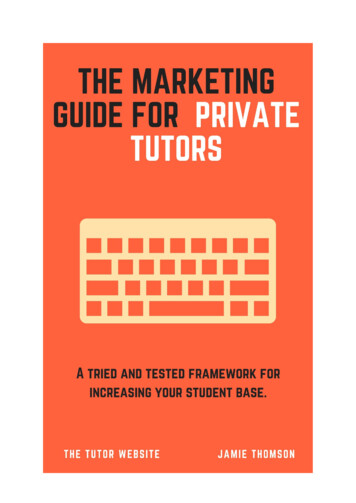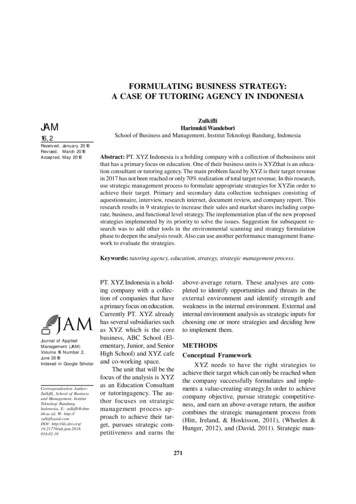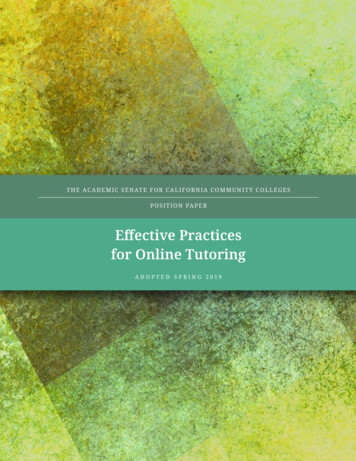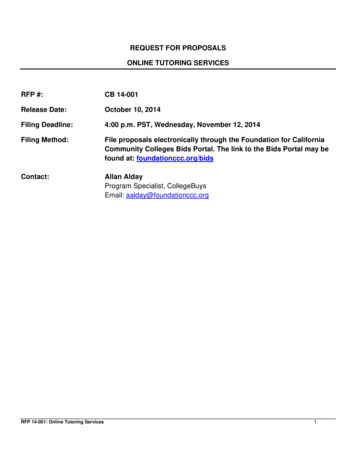
Transcription
How to Start aTutoring Businesson a BudgetBy Premierline
ContentsIntroduction pg 3Advantages and Disadvantages of running a self-employed tutoring businesspg 3Qualificationspg 4PGCE Courses pg 4Licences pg 5Working with children pg 5Business status pg 6Choosing a suitable business status pg 6Premises pg 7Two options to consider pg 7Option 1: Tutoring in personOption 2: Become an online tutorEquipment pg 8Things to consider. pg 8Getting a website pg 9Your website will be your shop windowpg 9It’s easy to build a website yourself pg 9Marketing pg 10Use a tutoring agency pg 10Utilising Social Media pg 11Taking payments pg 12Payment Methods pg 12How much can you expect to be paid?pg 12Insurance pg 13Protect your business against the unexpectedCovers to considerpg 14Our contributors pg 142
IntroductionBecoming a tutor is one of the most satisfying ways you canearn a living, and it’s not only teachers who can do it: anybodywith specialist knowledge, as well as plenty of patience, canbecome a private tutor.However, to earn a living this way takes more than just brainsand a notebook. If you’re looking to establish yourself as aself-employed tutor, there are a few things you need to know.This tutoring business guide offers a few helpful startingpoints to help you get going, starting with a quick list of prosand cons.Advantages and Disadvantages of running aself-employed tutoring business:AdvantagesDisadvantagesLow start-up costsLow overheadsA lot of competitionYou must work around someoneelse’s scheduleGetting new students on board canbe difficultYou may need to obtain a PGCE and/or a CRB/DBS certificate if you plan toteach children or vulnerable peoplePotentially profitableA year-round service3
QualificationsAlthough no qualifications are actually essential in order to become atutor, they can certainly help. A Post Graduate Certificate in Education(PGCE) for example would give you a solid basis to start from, and couldbe very useful for securing tutoring work.PGCE CoursesPGCE courses take nine months to complete – if studied full-time – andare worthwhile for most private tutoring work, especially if you arelooking to work with children or young people.Jamie Thomson, The Tutor Website“There’s no official accreditation for private tutors in the UK, but it isrecommended that tutors at least hold a degree”.4
LicencesJamie Thomson, The Tutor Website“If your students are primarily adults over 18 years old, you don’t necessarily need to have a CRB or DBS certificate, although having onewill give your tutees piece of mind”,Working with ChildrenIn order to work with children or vulnerable people, you need toget a DBS certificate. This is the same as a CRB certificate (CriminalRecords Bureau), but is now called a DBS certificate: the CRB and theIndependent Safeguarding Authority (ISA) merged into the Disclosureand Barring Service (DBS) in 2013.There are three types of DBS Check: basic, standard and enhanced.Anyone looking to work with children will need to get an enhanced DBSCheck. If you are operating in Scotland or Northern Ireland the processis slightly different as they use different registered bodies: Scotland isadministered by Disclosure Scotland and Northern Ireland is overseenby Access Northern Ireland.As applicants cannot complete a DBS check themselves, a third partyorganisation such as an employer, recruiter or tutoring agency will needto complete the form on behalf of the tutor in order to make it legal.5
Business statusChoosing a suitable business statusSomething you’ll need to decide relatively early on is your legaltrading status. You could establish yourself as a sole trader or a limitedcompany, or if you’re teaming up with a fellow tutor you could set up asa partnership. There is no right or wrong answer here – it’s completelyup to you. All have advantages and disadvantages, as well as tax,financial and legal implications.The UK Government website provides some useful information andguidance to help you decide which option is best for you. Optionsinclude: Limited CompanyLimited Liability PartnershipPartnershipSole TraderOperating as a sole trader is often a favourable option by self-employedtutors as this allows them to keep 100 per cent of their profits (aftertax). This does mean however that they are personally liable for anylosses the business incurs. If you are looking for legal separation fromthe business then consider setting up a private limited company.This would mean that all finances are kept separate. If you decide onthis option then you will need to register with Companies House andnominate at least one company director for your tutoring business.Once you’ve decided your business status, you must register with HMRevenue and Customers’ (HMRC).6
PremisesTwo options to considerJamie Thomson, The Tutor Website“Have a think about where will lessons take place. Is there enoughspace in your home to provide a stimulating learning environment?You should also consider your utility bills and whether the cost of yourutilities will increase as a result of your businessOption 1: Tutoring in personMost tutors will either work from home or travel to a student’s house.If you are travelling, overheads for petrol, public transport costs, etc.should be considered when charging for your services.If you are a private tenant, you should check that you are permitted torun a small business from your home. Some tenancy agreements haveclauses in place that restrict certain businesses from operating, so it isworth checking out before you start your private tutoring business.Jamie Thomson, The Tutor Website“If you offer private lessons at your own home, you have a legal dutyto make sure you’re providing a safe environment. It is also worthmentioning to potential clients if you have any pets, in case they haveallergies or are uncomfortable around them”Option 2: Become an online tutorOnline tutoring has increased in popularity as internet speeds andbandwidth have become more efficient. With easier access into theindustry, competition in the tutoring industry has soared, although itis useful to point out the positives and negatives before becoming anonline tutor:PositivesDisadvantagesNeither tutor nor student needs totravel anywhereRapport is less natural, and non-verbal communication cues are moredifficult to assessDifficult to strike up a relationship(and incur repeat business)Getting parents involved can betough, and might be an issue forthem if they cannot meet youDelivering critical learninginformation, such as enunciatingduring a language lesson, can beeasily miscommunicatedYou can have more flexibility withtheir lesson schedulesStudents have the option of anytutor, regardless of country or timezoneStudents could be less likely to beshy, and more focused, duringan online tutorialCan be an answer to local tutorissuesTo see if online tutoring is right for your tutoring style, take a look at thisreport (‘Online Tuition in the UK’) for all the answers you need.7
EquipmentThings to consider.To become a private tutor you need a few essentials. The TutorHubrecommends the below:LaptopWindows based laptops are available from around 350. Anythingsmaller than a 13.5” screen may be too small to work on, while 17”screen devices might be too heavy if you’re taking it to a student’shouse. Chromebooks have a tempting price tag, but be aware that theycannot run Microsoft Office.MicrophoneMost laptops will already have microphones installed, but the audioquality tends to be poor. If you invest in a microphone headset (whichusually costs around 10), the quality of sound will be much clearer forstudents if you ever need to work with them online.WebcamThis will probably already be on your laptop too, but again the qualitymay be poor. An external webcam will give you a much clearer pictureand will help you if you are conducting online tutorials. A webcamusually costs around 20 - 30.8
Getting a websiteYour website will be your shop windowMany prospective customers will search online to find tutors in theirlocal area, so having a professional looking website is essential. Yourwebsite is your shop window into the services you can offer as a privatetutor. If you’re building a website from scratch, you could benefit fromdoing the following things: Focus on your expertise. Include information about you, yourqualifications, how long you have been a tutor and what inspiredyou to teach. Write about your specialist subject and anything elseyou think would be of interest to potential students or parents. Additional information about your business – hourly rates and travelcharges if applicable, as well as any other information that you thinkcould be useful. Credibility - Once your business is up and running, ask customersfor testimonials and publish these on your site. This can helpdemonstrate your professionalism and boost your credibility toother prospective customers.It’s easy to build a website yourselfSome platforms to build a simple but professional-looking website onare: WixThis is a free website builder, ideal if your mobile coffee businesshas a limited budget and you need to use an efficient platform. WordPressWordPress is a popular, fuss-free platform: you can add plugins,themes and images easily, which is beneficial if you wish to adda personal style to your website. WebsWebs helps create a website for free, with upgrades availablewhenever you are ready.9
MarketingPrivate tutoring businesses rely heavily on word-of-mouth, as wellas the repeat business they naturally gain over time. In order to findstudents, and get students to find you, there are a few things you can doto make it easier:Use a tutoring agencyOne way to attract new customers is to sign up with tutoring agencies.Here you can put yourself in front of prospective students/parents withvery little expense. These sites are usually free for tutors to sign-up to,as the sites make their money via commissions from students.Henry Fagg from The Tutor Pages“Agencies differ quite widely in their approach. Some can be verysupportive and will offer teacher training, professional developmentand social events. There is also a certain kudos to working with someof the more prestigious agencies, so it can be good for the CV. Otheragencies (particularly online ones) are very ‘hands off’: they will introduce new students to a tutor but do very little else. It is important tonote that, by law, a tuition agency is only allowed to charge the clientand not the tutor”PayPal is the preferred method of payment on these types of sites, sosetting up a PayPal business account in advance will help you get paidquicker.Some online tutoring agency sites commonly used are: Complete TuitionYou can advertise your services for free and tutors only pay foradvertising once they secure a student. The Tutor WebsiteTo register on this site you need to have at least a universitydegree. Registrations costs 25 for an entire year and only costs 10 to renew. Tutor HuntTutor Hunt allows you to register for free, and doesn’t chargestudents any commission for using you. Tutor MeThis site connects students with tutors from their virtualclassroom, and specifically takes on tutors from GSCE topostgraduate level. First TutorsHourly rates are chosen by the individual and signing up is free.10
MarketingUtilising Social MediaAs a tutor, you want to show prospective students that you are not onlyknowledgeable, but that you are easy to get in touch with. Social mediais a great way for you to do both of these things on platforms that mostpeople use on a daily basis.Facebook and Instagram are good for prompting dialogue earlyon between students and tutors. Short videos, images, and briefexplanations of your services, are easy ways to show you operate astrong business. Facebook is especially handy for keeping in touch withtutees, and for quickly responding to any queries they may have. Ifprospective students notice you respond quickly, they are more likely totrust that you are going to help them in the long-run.Business cards are another cost-effective way to get your name outthere, and are especially useful if you are looking to capture an audiencewho isn’t online:Oliver Naylor, Complete Tuition“Once you have set up and are providing a great service, use yourexisting clients and word of mouth to grow your business by passingbusiness cards to each new parent who will then forward them onwhen recommending you”Paid marketing activities, such as Pay-Per-Click (PPC) advertisingcan also be useful, but you do run the risk of not being seen if biggercompetitors, with larger budgets, are fighting for the same marketspace:Oliver Naylor, Complete Tuition“PPC and AdWords can be useful for larger tutoring agencies butaren’t as effective with smaller marketing budgets, as you never reachthe critical mass required to see the return”Another approach to get your name out there is to work at an afterschool tuition centre:Oliver Naylor, Complete Tuition“Many of these centres are run as franchises (examples includeKumon or Magikats). Other companies in this sector employ theirtutors. The most prominent supplementary education employer ofthis kind in the UK is Explore Learning”11
Taking PaymentsPayment MethodsIf you are working for yourself, you will likely receive payment by eithercash, PayPal, cheque, or bank transfer. Of all the payment options,cash is simplest: cheques can take a while to clear, so avoiding them isadvisable if you want to be paid quickly; Bank Transfers, whilst efficient,can get rather confusing to keep up with, especially if you are beingpaid by multiple students/parents. PayPal is gaining in popularity all thetime. It allows you to create invoices and request money from studentseasily, but be aware that you wi
setting up a PayPal business account in advance will help you get paid quicker. Some online tutoring agency sites commonly used are: Complete Tuition You can advertise your services for free and tutors only pay for advertising once they secure a student. The Tutor Website To register on this site you need to have at least a university











